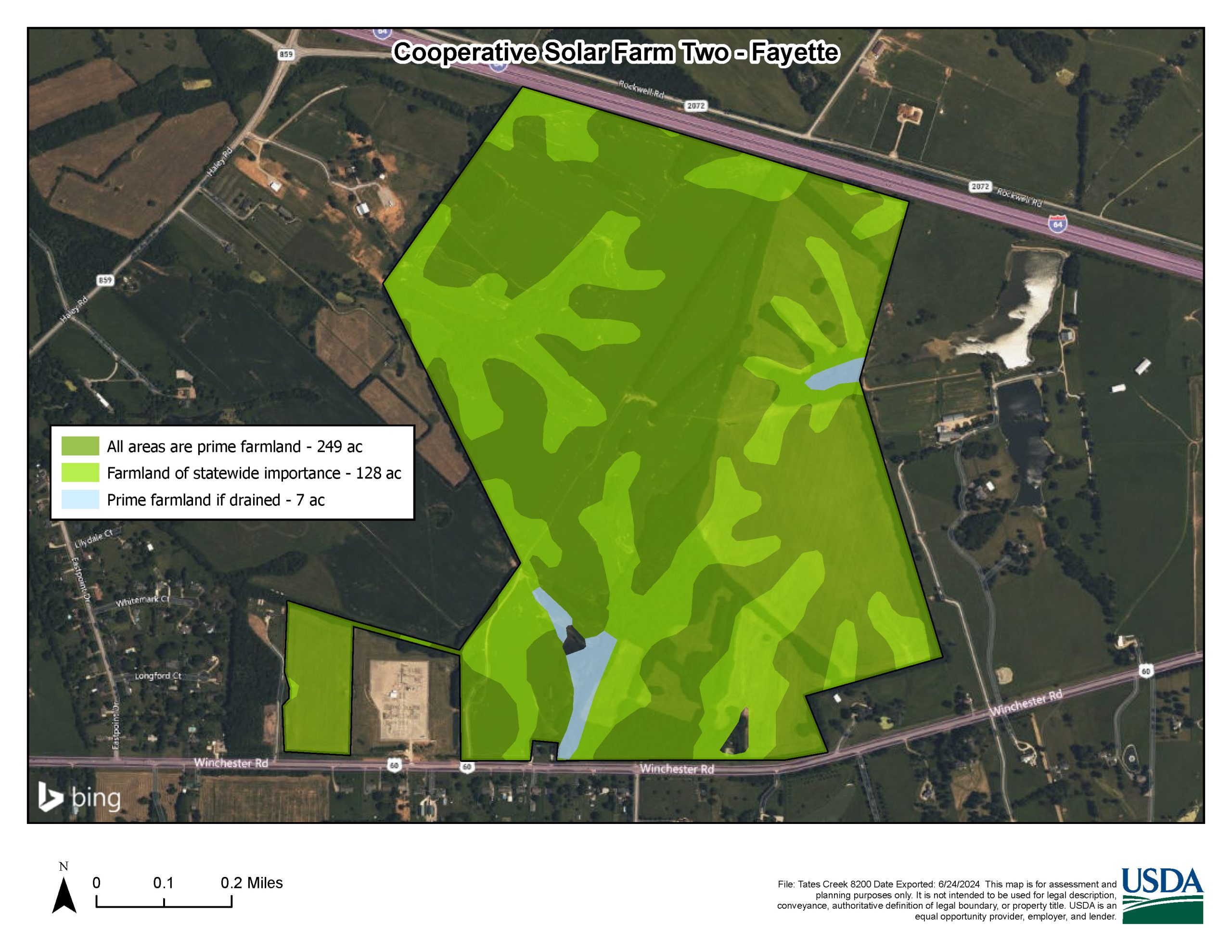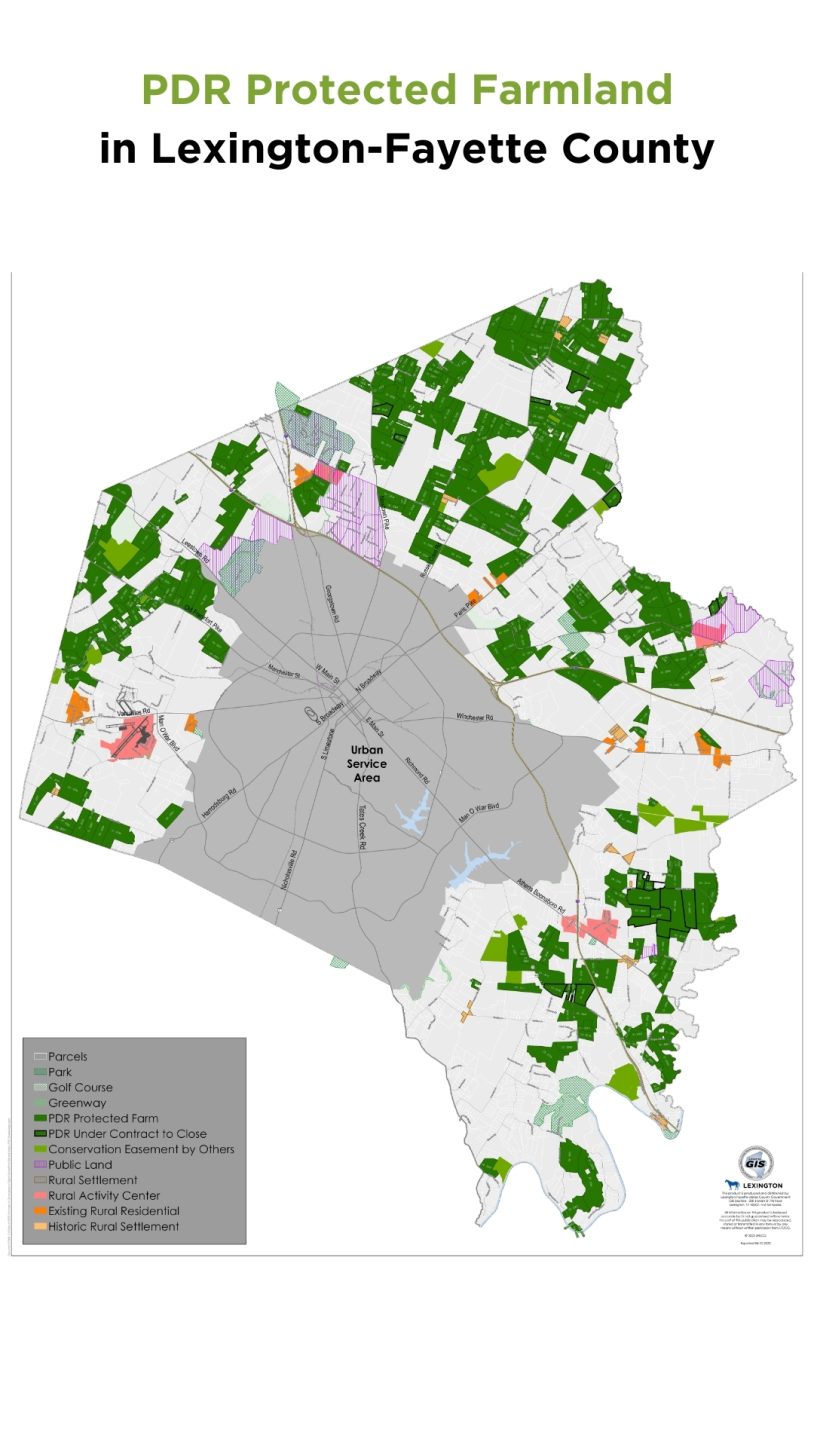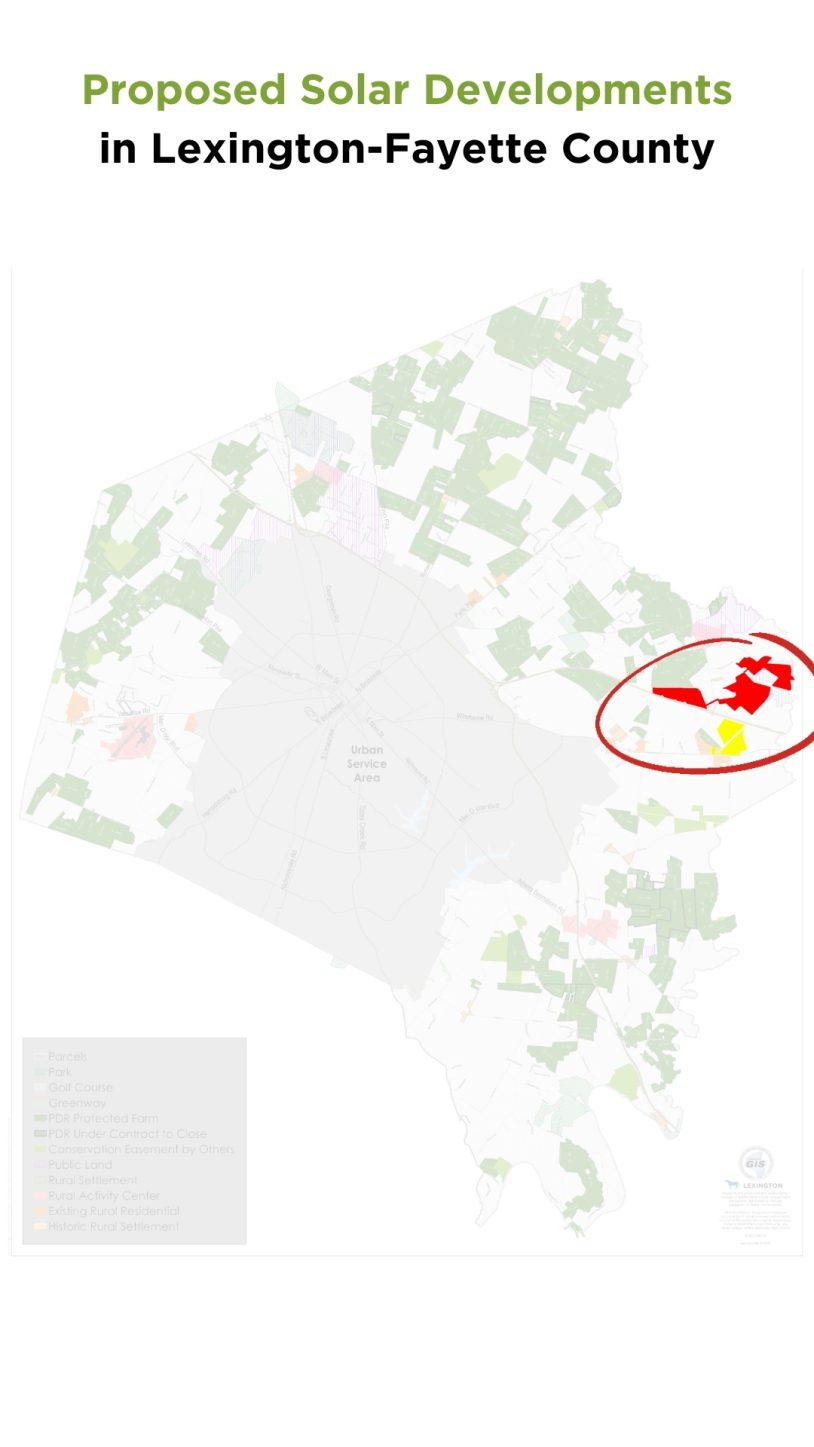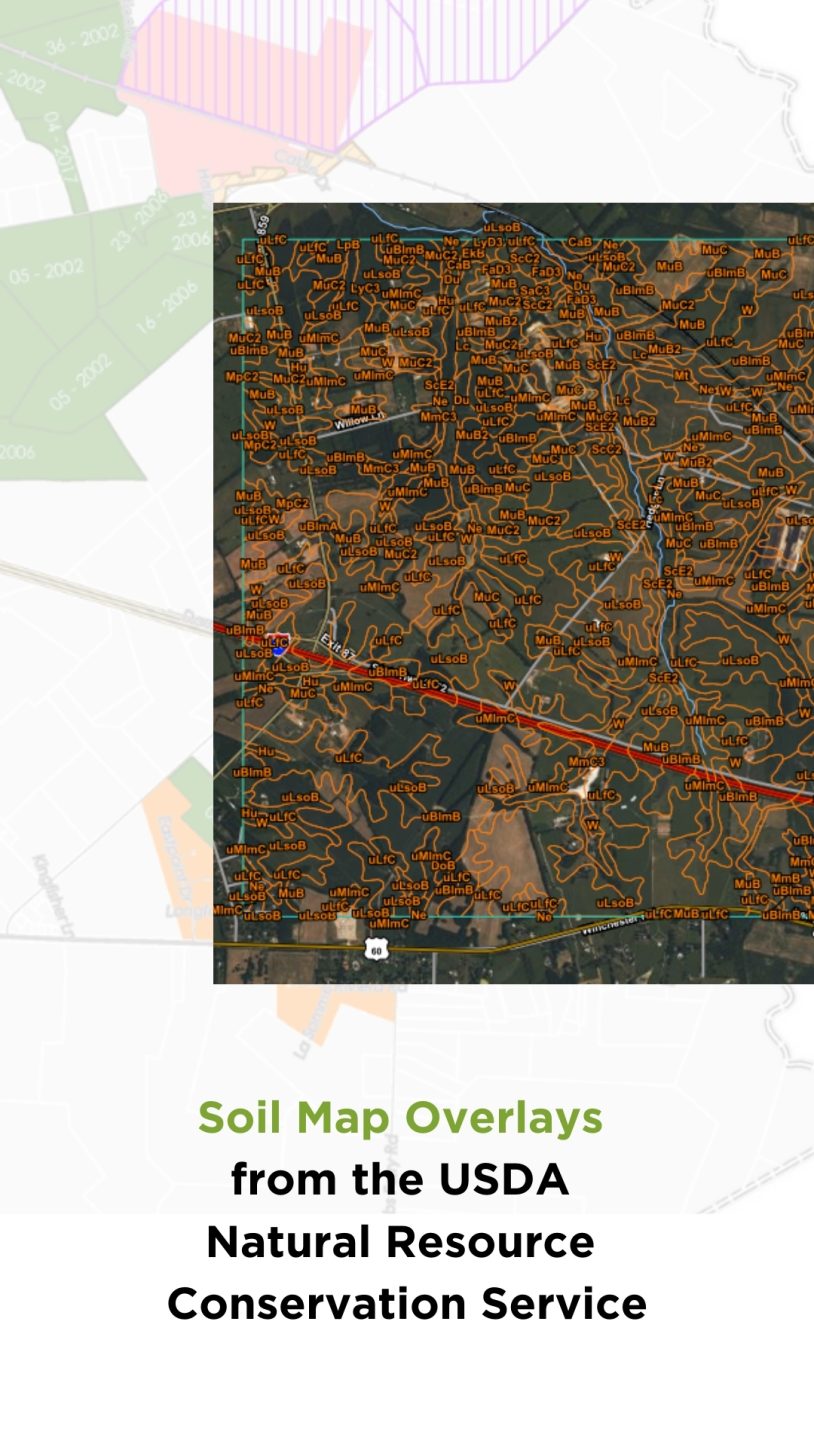Industrial Solar
Silicon Ranch, a Nashville-based and privately-owned solar company, has proposed a Zoning Ordinance Text Amendment (ZOTA) that would permit industrial solar development throughout Lexington-Fayette County, including in the Agricultural-Rural zone.
- Details: The ZOTA was proposed to accommodate an approximately 800-acre solar farm off Haley Road in the Agricultural-Rural zone, made up of multiple tracts of land.
- Need-to-know: This ZOTA change would apply county-wide, allowing for more developments of this type in the Agricultural-Rural zone.
- Fact: In 2018, Shell became the largest shareholder in Silicon Ranch.
View Silicon Ranch Project Photos

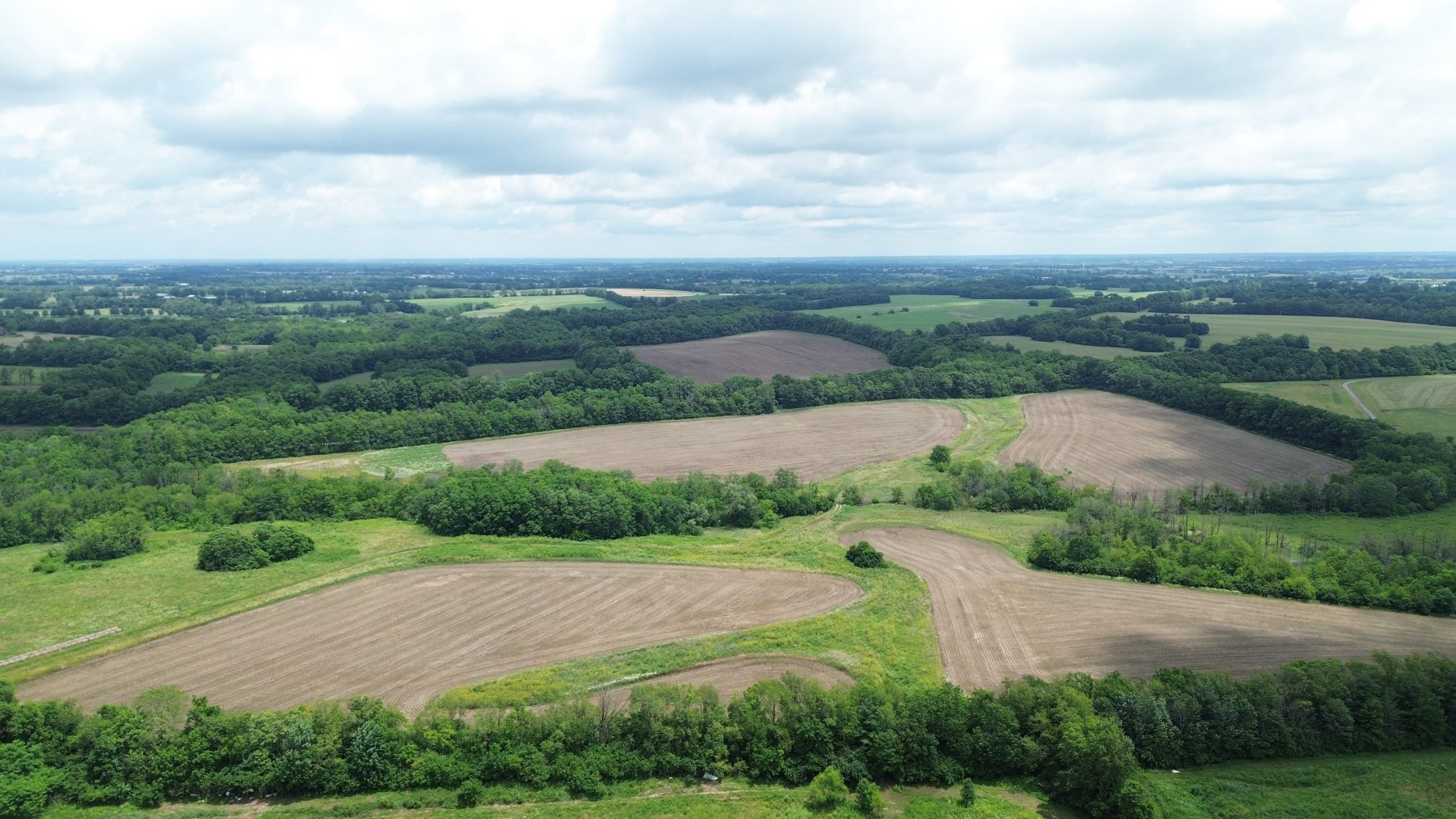
This is just a small portion of the 800 acres proposed for development. — Photo by Fayette Alliance
Updates
August, 2025
On Tuesday August 19, the LFUCG Urban County Council convened for a Work Session to discuss regulations for solar energy systems throughout the community and whether to allow industrial-scale, ground-mounted solar energy system development on our Agriculturally-zoned land.
- Outcome: The Council did not approve regulations to allow large-scale, ground-mounted solar in Agricultural zones.
However, that’s not the end of this story.
- More details: No vote took place during the Work Session on this particular issue because Councilmember Sevigny, believing there were not enough votes required to pass this specific policy within the proposed ZOTA, suggested moving the industrial-scale solar on farmland issue to a work group for further discussion.
Workgroup Details
The work group is expected to consider whether there are appropriate conditions and restrictions for solar in ag zones and, hopefully, urban-focused alternatives.
Fayette Alliance will be advocating for the group to discuss and include:
- Community stakeholders who own large areas of land which may be appropriate for urban solar projects: government buildings, the University of Kentucky, FCPS, Bluegrass Airport, and business leaders like Hallway Feeds who have experience installing solar at an existing business in Lexington-Fayette County.
- Soil experts and active farmers in Lexington-Fayette County to provide information on Fayette County soils and real impacts to farmland to be considered and conditions that may be required to mitigate them.
Proposed Amendments:
During the Council Work Session, several amendments were introduced, such as limiting solar development in Agricultural zones to 1% of rural land (~1,800 acres), requiring soil monitoring and testing every 5 years along with some type of land management plan, as well as a certain percentage of vegetative cover (not defined) on any solar development.
- However: Because the overarching policy that would allow large-scale, ground-mounted solar in Agricultural zones was not passed, these amendments would not apply or permit projects by private developers at the local level even if ultimately passed as part of the larger ZOTA.
The purpose of the proposed amendments was stated to be to guide the state Public Service Commission in evaluating future public utility projects that are not subject to local planning and zoning before the Work Group finishes its discussion and makes more formal recommendations.
This is a complicated ZOTA with impactful implications of policies that will still need to be worked out, but it will continue to move forward at this time without allowing large-scale, ground-mounted solar development in Agricultural zones.
Thank You
First, Fayette Alliance would like to thank the LFUCG Urban County Council for their dedication to achieving net-zero energy emissions by 2050, and for carefully and thoughtfully considering the complex and impactful decision to not permit industrial-scale, ground mounted solar energy facilities on our Agriculturally-zoned land at this time.
Secondly, we would like to thank all who advocated on this issue by emailing our Councilmembers, posting on the Engage Lexington solar forum, sharing our social media content, and speaking at City Hall.
One Final Note
Lowering our carbon emissions is an important issue, and industrial-scale solar can be divisive. It is unique in that it often pits environmentalists against other environmentalists.
We understand that not all Fayette Alliance supporters agree with our position.
We would like to thank those who have engaged in meaningful, thoughtful, and beneficial conversations about industrial-scale solar regulations, and respectfully expressed their opposition to our stance on this issue.
Engaging in civil discourse helps us grow and learn from one another, and disagreement doesn’t need to lead to division.
Position Statement
Read Our Solar Energy Systems Position Statement
Here’s What We Think
Fayette Alliance is supportive of renewable energy development, particularly solar on rooftops, brownfield sites, industrial areas, and already built environments.
- However: We have serious concerns about the impacts of locating large-scale solar facilities on Lexington-Fayette County’s world-renowned soils. In addition to the environmental impacts and the loss of prime, nationally significant farmland, we are concerned about the precedent set by permitting these types of commercial and industrial uses in our agricultural zones.
Large-scale solar development is a complex land-use issue that must be thoughtfully addressed and informed by research and analysis.
- Important: It’s critical that our community efforts for sustainability don’t come at the expense of the land that makes Lexington so unique.
About the Soil
- Soil Map provided by USDA
- Soil Map provided by USDA
The United States Department of Agriculture defines “Prime Farmland” as such:
“Land that has the best combination of physical and chemical characteristics for producing food. It has the combination of soil properties, growing season, and moisture supply needed to produce sustained high yields of crops economically if it is treated and managed according to acceptable farming methods.”
Using the USDA’s Web Soil Survey map, we attempted to determine approximately how much of the land proposed for solar development was categorized as “Prime Farmland.”
Process
- We took a map of Lexington-Fayette County’s PDR-protected farms.
- We overlaid maps of the proposed solar development sites.
- We then used those maps to identify the soil quality of the proposed areas.
By our calculations, approximately 98.06% of the soil proposed for solar farming is considered “Prime Farmland” or of “statewide significance” by the United States Department of Agriculture.
- Need-to-know: None of the proposed acreage is used for equine operations.
- Consider: The soil that’s at risk is rich, fertile, and irreplaceable; capable of producing food for generations to come.
Full Details
We compiled our research and other soil-related information into short, easy-to-read PDF packets — one each for the proposed industrial solar projects. The studies include:
- maps of the proposed solar sites
- soil maps of the land proposed for development
- breakdowns of the soil types, including acreage and classification
- and more.
Click the buttons below to explore each soil study in detail.
Soil Study: East Kentucky Power Cooperative
Solar Spotlight
- Lexington, KY | The Locust Trace Agri-science Campus is a public school in Lexington-Fayette County specializing in the education of Agriculture Engineering, Animal Science, Equine Studies, Food Science, and Pre-Veterinary Studies. The 70,000-sqft. campus was designed to produce more energy than it consumes annually, making it a net-zero school within the Fayette County Public School system.
- Denver, CO | The Denver Public School (DPS) system is committed to reducing its overall greenhouse gas emissions by at least 90% of the emissions that existed in 2010 by 2050. DPS even has its own Sustainability Department to help achieve this goal. Solar panels have been installed on the rooftops of various DPS buildings throughout the city, and solar carports have been installed in parking lots. The carport panels were constructed in partnership with the City and County of Denver and will provide bill credits to DPS families who need relief on their energy bills.
- Arizona State University | ASU’s comprehensive solar program produces over 53MWdc of energy — enough to power approximately 30,000 single-family homes. The university utilizes both on-site and off-site solar installations to generate this energy. The on-site component of its solar initiative extends to four different campuses and the ASU Research Park, totaling approximately 80,000 solar panels.
- Rutgers University | Rutgers University has installed solar panels in 16 different parking lots across its facilities. These multifunctional installments generate approximately 3% of the university’s total energy consumption, and also provide much-needed shade to faculty, staff, and students in the summer months. Clemson University and Michigan State University have begun construction of similar projects on their campuses. complete a similar project on its campus.
- Santa Cruz, CA | This California city incentivizes its commercial businesses to invest in solar through rebates, free energy audits, and a city-wide Green Business Certification program.
- It’s important to note that Lexington incentivizes residential solar investment through its Solarize Lexington program. However, commercial businesses often have more land and square footage to accommodate solar infrastructure.
- San Antonio, TX | Last year, in September of 2023, the city of San Antonio, Texas allocated $30 million to construct solar panels on 42 different city-owned properties. Solar panels will be installed on rooftops, in parking lots, and in city parks to create shade canopies for residents. In total, this project will offset an estimated 11% of the City’s electricity consumption from its buildings.
- Evansville, IN | Evansville, Indiana Regional Airport has installed solar canopies throughout its parking. This solar installment is the Midwest’s largest airport solar canopy, and the second largest in the US. This initiative generates enough energy to offset 50% of the airport’s power.
- Ubiquitous Energy | This US-based company has invented a thin coating that turns windows into transparent solar panels. The company estimated that utilizing this new coating would be able to provide approximately 30% of a building’s energy needs.
- The Netherlands | In 2018, the Netherlands built solar bike paths spanning 1,000 square meters. These are not simply bike paths with solar panels placed alongside, rather, the paths themselves contain solar cells that are protected by a multilayer of resin, and the electrical architecture has been designed to reduce the amount of wiring.
- Belgium | A two-mile-long rail tunnel has been outfitted with 16,000 solar panels in Belgium, providing enough energy to power all of the trains in the country for one full day.
- India | The Cochin International Airport in India is the world’s first airport fully powered by solar energy, winning the “Champions of the Earth” award instituted by the United Nations in 2018. To achieve this, the airport utilizes 46,150 solar panels laid across 45 acres near its cargo complex.
Press and Media
Forward Kentucky | May 23, 2024
FOX56 | Solar Farm Info Session | July 9, 2024
WEKU | Solar Farm Info Session | July 9, 2024


